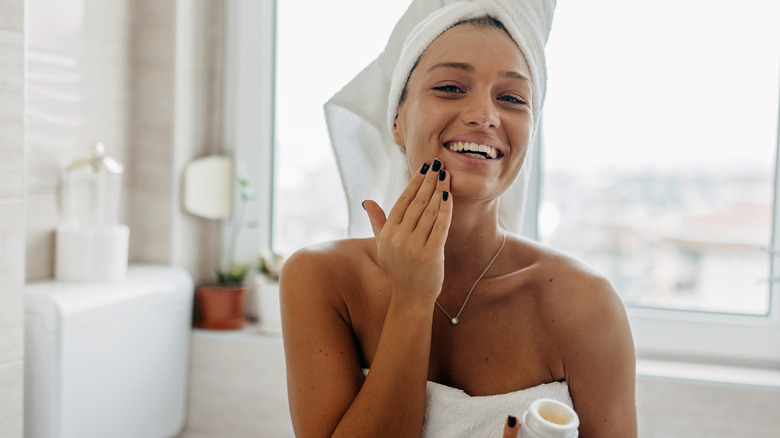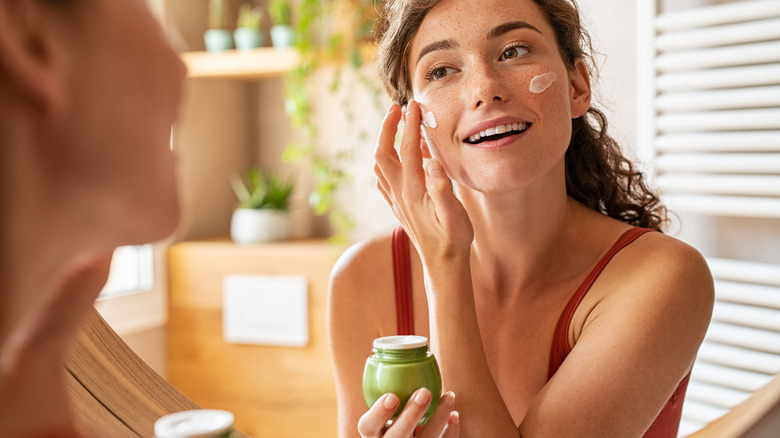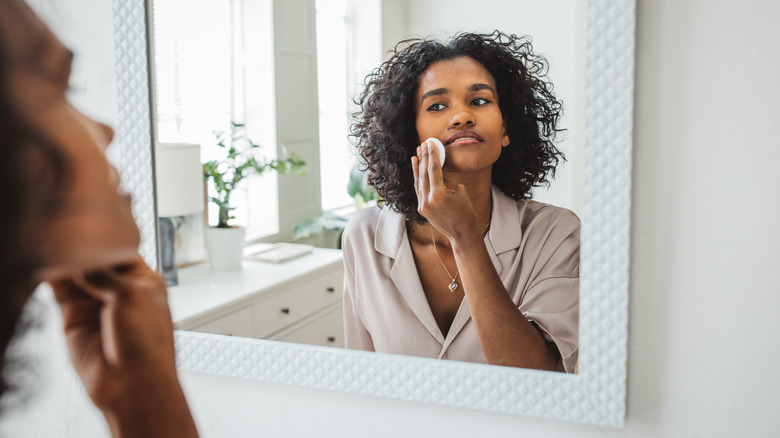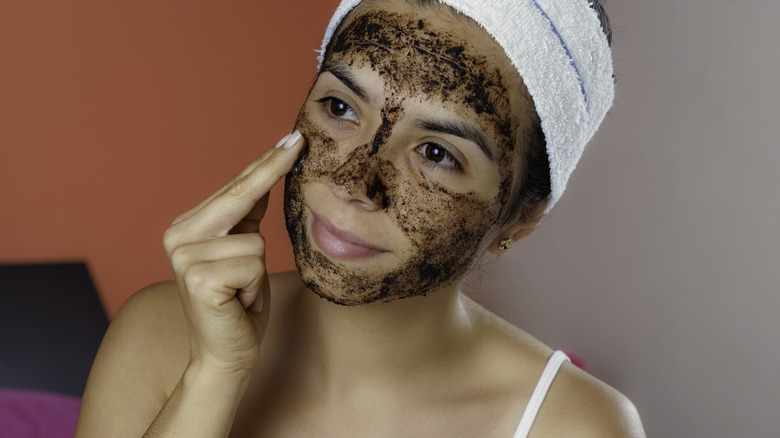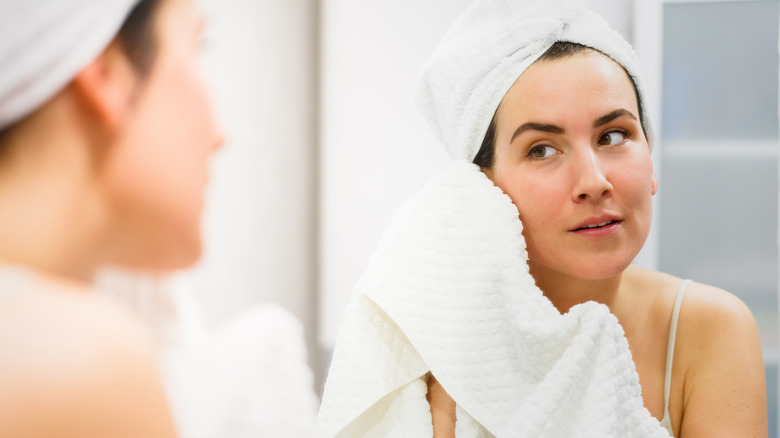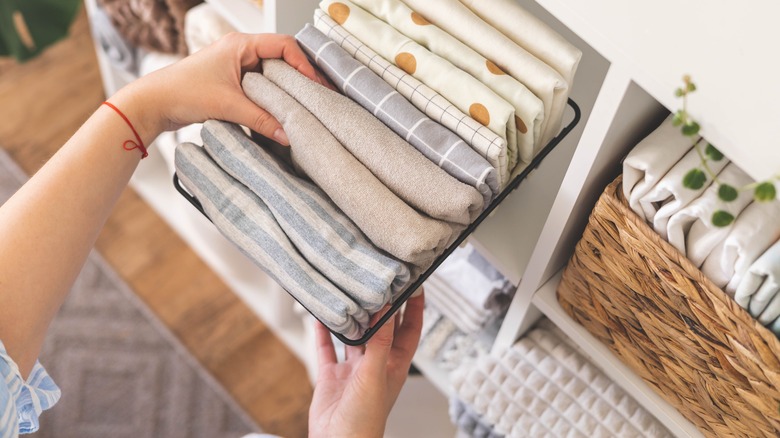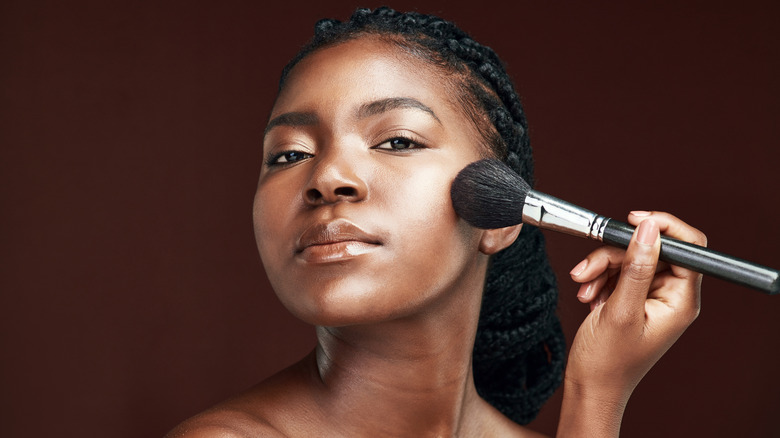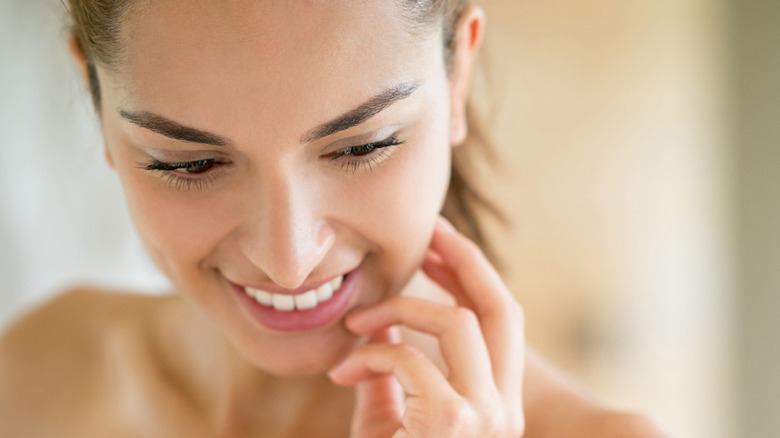We Have The Secrets To Defeating Summer Acne (Because Who Wants To Breakout At The Beach?)
It's no secret that fresh and glowing skin can boost your appearance this summer, especially when it comes to your face. That's right: a healthier complexion means you'll exude radiance with lighter-weight makeup, more natural tones, and perhaps a hint of bronze. But, if your face has more grease than shimmer and more spots than you'd care to count, you may not be feeling so confident.
Environmental factors including sweat, heat, and humidity may trigger or aggravate existing acne. And let's not forget the stress of traveling — that excess cortisol can wreak havoc on your skin. So, if you are especially acne-prone, you may need to bump up your skincare routine and manage your stress. Above all, you'll need to watch out for common magnets that trap dirt and bacteria, as these will exacerbate sensitive skin. We've got the secrets to preventing summertime acne so you can look and feel your most radiant in (and out of) the sun.
Use a lightweight moisturizer and sunscreen
There are many reasons to go light in the summer. In fact, fresh and breezy is the way to go when it comes to your hair, your clothes, and your attitude. When it comes to your skincare, you'll want to feel light as well. Going heavy with the face cream can feel greasy during those hot and sticky months, and it may also make your acne worse. That's why dermatologists recommend a lightweight moisturizer when it comes to your face.
"In the summer months, increased sweating can lead to clogged or obstructed pores. But we do know that certain sunscreens and moisturizers, especially those that are a little bit thicker, can contribute to more clogging and further the development of acne," Dermatologist Sean McGregor shared with Cleveland Clinic.
But if you're tempted to go without moisturizer, think again. The purpose of a moisturizer is to keep your skin hydrated. Dehydrated skin is prone to acne because it triggers your oil glands to compensate by overproducing, which leads to clogged pores. So, go ahead and use a moisturizer, but opt for a lightweight formula. According to Clear Skin, if you are especially acne prone, consider one that is non-comedogenic and hypoallergenic, contains an SPF, and includes moisture-balancing ingredients like ceramides, humectants, and lactic acid.
Go oil-free
A hydrating moisturizer is essential for smooth and supple skin. But be sure you are choosing non-comedogenic, oil-free products if your skin is acne-prone. When the sun is out, the heat is high, and the sweat factor is aplenty, your skin will likely be producing more oils. Hence, adding more oil to the mix will only add to your pore-clogging woes.
Look for main ingredients such as glycerin — it will help moisturize without the added oils. Not only is glycerin oil-free, but it also protects against harmful UV rays, is a natural exfoliator, and may help tighten your pores, according to Skinkraft. Other best bets include active ingredients like hyaluronic acid and niacinamide to lock in moisture, according to Harper's Bazaar. But beware many products contain a multitude of ingredients, some of which may be irritating for you. So, if you are simply going haywire trying to decipher ingredients, check with your dermatologist for their recommendations on oil-free products to suit your specific skincare needs.
Cleanse properly
There's no escaping the sweat when it comes to summer. In fact, sweating helps keep your skin cool and that's a good thing. But a hot, sweaty face is also likely to have increased oiliness, according to Adore Beauty. This not only clogs pores but is also a magnet for bacteria (a double whammy when it comes to acne). So, to stay cool and clear of breakouts, cleansing properly is a must. How often you cleanse can be the difference between red and blemishy skin, versus skin that's clear of breakouts.
Wash your face up to twice a day to properly remove sweat, dirt, and oils, and increase healthy skin turnover, according to Byrdie. And don't let that sweat sit for too long. If you've just finished a heavy workout or perambulated around in strong humidity, by all means, wash away. But don't go overboard. Overwashing can dry and irritate the skin, which can trigger inflammation and lead to acne flare-ups, Dermatologist Adam Friedman told Byrdie.
Include exfoliation in your skincare routine
It's a good idea to exfoliate your skin no matter the time of the year. But it's an especially good idea in the summer. For one, it sluffs off dull skin cells for a more radiant and youthful glow, according to Rose Inc. What's more, exfoliating removes the excess oils from all that heat, humidity, and sweat. In doing so, it prevents dead skin cells from sticking together and clogging your pores. Whether you need to exfoliate daily or once a week depends on your skin type. But beware of over-exfoliating as it can strip your skin of its natural oils — resulting in cause dry, irritated skin. Start by exfoliating one or two times a week, and increase frequency only if your skin can tolerate it. People with acne-prone skin may achieve the best results by exfoliating as often as four times a week.
Use a clean, dry towel
During those summer months, your skin is already prone to pore-clogging bacteria, sweat, and excess oil. So, you may be reaching for a face towel more often. But you won't be doing your skin any favors if you don't wash your towels regularly. Even if there are no lipstick or base smears present, towels can contain bacteria not visible to the naked eye, according to laundry experts for Martha Stewart.
Wash your towels after three uses — max. "It's important to wash them frequently — not only do they have close contact with your face, but they can also absorb water or sweat and become breeding grounds for bacteria," Anna Utley, the general manager of the consumer products group at Whirlpool Corporation told Martha Stewart. Be sure the towel you use to wipe your face is dry. Because a wet or damp towel that has been sitting for some time is another easy magnet for the type of bacteria you should keep away from your face.
Wash your hair frequently
Summer is here, which means there are longer, more seemingly carefree days. Whether you're mildly perspiring under a veranda or playing volleyball in the hot sun, your oil glands will become super primed for production (including those on your scalp). Hence, sweat and oily skin can go hand in hand. So, keeping your hair away from your face may be advisable, especially if exposed to humidity or are physically active outdoors.
Pulling your hair back in a ponytail or top knot — will keep some of your hair's sweat from dripping onto your face. But it may not be enough. If you aren't washing your hair more frequently, oils from your hair can make their way to your face. Think about it: hair that drips with sweat or any wayward strands may grace your forehead and cheeks. So, it's best to wash your hair often enough to prevent summertime breakouts. According to Better-NotYounger, determining how often is up to the individual. For those with limp and fine hair, that can mean every other day. Active women may have to wash as much as three times per week. For those who spend more time indoors, it can be less.
Wash your pillowcases often
A clean pillowcase sets the stage for a cleaner face in the morning. When summer hits, you want to feel your freshest, so wash your pillowcases regularly. And, during those hot summer months — especially if you wake up with beads of sweat — you may have to change your bedding more often. In fact, it's a good idea to wash your pillowcase every two to three days, according to Linenly. That's because bacteria (those hidden microorganisms) can accumulate on your bedding; and the combination of dirt, sweat, and bacteria can wreak havoc on your face.
Not a frequent washer? "Once a week is a good start, but if you're having active breakouts, wash your pillowcases and sheets twice a week," Nazanin Saedi, MD, a board-certified dermatologist in Philadelphia and clinical associate professor at Thomas Jefferson University told Byrdie. If your skin is extremely sensitive, Saedi recommends opting for silk linens "because they don't trap bacteria like cotton". They are also gentler on the skin and may even help prevent wrinkles.
Wash your makeup brushes
When the weather is humid, you may be hitting the powder room often to prevent a greasy appearance. But if you aren't washing your make-up brushes more often, a shiny forehead may be the least of your worries. Consider this: Your makeup brushes are a magnet for dirt, oils, (toilet) germs, and bacteria — as well as the residuals from products you apply regularly to your face, according to Byrdie. As such, if you don't wash your brushes on the reg, you are more likely to suffer from breakouts.
The American Academy of Dermatology recommends you wash your brushes weekly (or at least every ten days). To do so properly, rinse the tips of your brushes under lukewarm water. Next, fill a bowl with clean lukewarm water and add a small dollop of shampoo. Swish your brush tips in the sudsy water and work the ends of the brush with your palms to release the dirt and residue. Then, rinse until the water runs clear. Lastly, lay your brushes flat on a towel to air dry.
Stop touching your face
While touching your face is not advisable during any time of the year, you'll want to curtail that habit if you want to prevent summer breakouts. Your skin produces more oil when the heat is intense, especially if you've got oily or sensitive skin. And touching your face will exacerbate the oily condition by spreading it around and clogging your pores, according to Full Spectrum Dermatology. Furthermore, your hands are constantly prone to dirt and bacteria. Think of all the surfaces you touch throughout the day, including your cell phone. To help keep summer acne at bay, be more mindful and find other ways to occupy your hands.
You can start by wearing gloves to remove direct hand-to-face contact — it will raise your awareness as well. Have a pen or your phone at hand to start writing or scrolling when you feel the urge to pick or touch your face. Place reminders or sticky notes on items you'll be handling most often — such as your wallet or cell phone — to curb your habit. And, according to the University of Maryland Medical System, a fidget spinner, stress ball, or even a rubber band, can be useful and handy objects to otherwise occupy your fingers.
Rehydrate skin and manage stress while traveling
Summer is a time for travel. Whether you are hopping a commuter flight to Seattle or on a 17-hour trek to the Virgin Isles, you may have to be especially mindful of your skin if you want to prevent breakouts. Dry cabin air, climate changes, and the added stress of making all your travel connections are all factors that may contribute to acne.
So, be sure to stay hydrated and be sure to have a travel-size lightweight moisturizer on hand to prevent acne while traveling, especially if you are traveling by plane. "The dry air on airplanes can irritate your skin, no matter what type you have. For those with already dry skin, the air on a plane can exacerbate the dryness, while those with oily skin could produce excess oils to compensate for the dryness," dermatologist Nazanin Saedi told Jefferson Health. Take extra special care by cleansing your face properly before boarding and after you arrive at your destination. Go sans make-up while commuting by air and avoid touching your face to help prevent impurities from collecting on your skin.
Once you arrive, be aware that climate changes can alter the pH balance in your skin. Humidity, higher temperatures, and air quality are just a few factors that can trigger inflammatory conditions of the skin — you guessed it, acne — according to Winston Salem Dermatology. That's another reason to stay on top of your skincare routine. If navigating the airport, getting through TSA, and making all your connections wasn't stressful enough, consider the effects of jet lag. Time zones affect your circadian rhythm, and can lead to elevated cortisol levels. So seek out some activities to reduce stress, restore calm, and try to get some quality rest.

